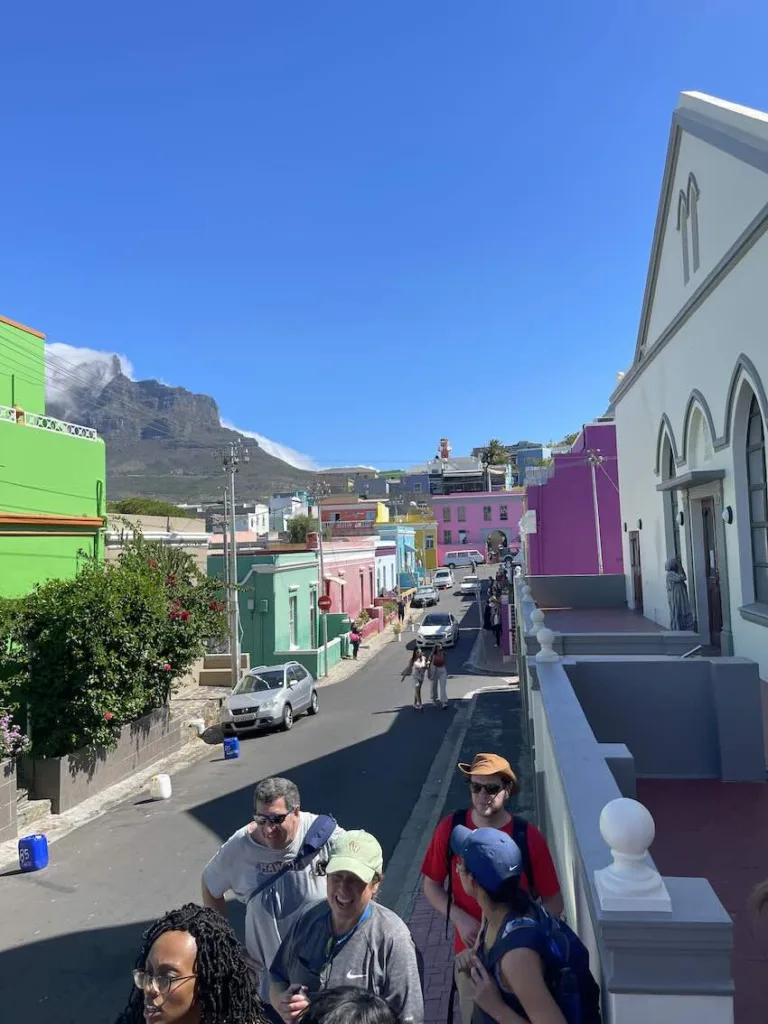CapeTown, South Africa—an extraordinary city that has captivated travelers from around the world with its stunning landscapes, rich culture, and vibrant energy. I first visited Cape Town a few years ago, and since then, it has become one of my favorite places on Earth. There’s something magical about this city—a unique blend of natural beauty, history, and modern vibrancy. In this blog post, I’ll take you through 12 fascinating facts about Cape Town that you might not know, along with personal insights, useful tips, and everything you need to plan your own Cape Town adventure.
Key Takeaways:
- Cape Town offers a perfect blend of adventure, history, culture, and natural beauty.
- Be sure to visit Table Mountain, Robben Island, and Cape Point.
- Bo-Kaap offers a colorful, cultural experience.
- Cape Town’s food scene is diverse, with something for everyone.
- The city is a gateway to adventure, wildlife, and art.
1. Cape Town is the Mother City
Cape Town is often called the “Mother City” of South Africa. This nickname reflects its role as the country’s oldest city, dating back to 1652 when the Dutch East India Company established a supply station here. The city’s early days as a trading post helped shape South Africa’s development, and its rich colonial history can still be seen in many of its landmarks today.

Personal Insight:
When I first arrived in Cape Town, I felt an immediate sense of history in the air. Whether you’re strolling along the cobblestone streets of the Bo-Kaap or visiting the iconic District Six Museum, the city is a constant reminder of its diverse cultural heritage.
2. Table Mountain is One of the New Seven Wonders of Nature
One of Cape Town’s most iconic landmarks, Table Mountain, was named one of the New Seven Wonders of Nature in 2011. Its flat-topped summit, which rises 1,085 meters above sea level, offers breathtaking views of the city, harbor, and beyond. You can reach the top either by hiking the many trails or by taking the famous Table Mountain Aerial Cableway.
Fact:
- Price for Cableway Ride: ZAR 380 (adults) | ZAR 190 (children)
- Hiking Trails: Free, though guided tours are available (around ZAR 600)
Rating: 4.8/5 (based on over 10,000 reviews)
3. Cape Point Marks the Meeting of Two Oceans
Cape Point, located at the southwestern tip of the Cape Peninsula, is where the Atlantic and Indian Oceans meet. Although it’s often confused with the southernmost point of Africa (which is actually Cape Agulhas), it still provides spectacular views of the rugged coastline and the dramatic cliffs.
Personal Insight:
A visit to Cape Point is one of the highlights of any Cape Town trip. I still remember the breeze and the awe I felt while standing at the edge of the continent, looking out over the ocean. It’s a moment that stays with you.
Opening Hours: Daily, 7:00 AM to 6:00 PM
Entrance Fee: ZAR 160
Google Maps Location: Cape Point
4. Robben Island: A Place of Power and Pain
Robben Island, located just off the coast of Cape Town, is famous as the prison where Nelson Mandela was held for 18 years. Today it’s a UNESCO World Heritage Site and an essential stop for anyone interested in South Africa’s history of apartheid.
Tour Price: ZAR 400 (adult), ZAR 250 (children)
Rating: 4.7/5
Tip:
Booking your tour in advance is highly recommended, especially during peak seasons. The ferry departs from the V&A Waterfront, and the trip to the island takes about 30 minutes.
5. Cape Town is a Diverse Culinary Hotspot
One of the things I love most about Cape Town is its culinary diversity. From fine dining restaurants like The Test Kitchen to casual eateries serving traditional South African dishes like biltong and bunny chow, the city is a food lover’s paradise. The Cape Winelands, located just outside the city, also offer world-class vineyards and wine tasting experiences.
My favorite spot:
- Restaurant: The Pot Luck Club
- Cuisine: Tapas-style with global influences
- Address: 373 Albert Road, Woodstock, Cape Town
- Social Media: Instagram
- Phone Number: +27 21 447 0804
6. Bo-Kaap: A Rainbow of Color and Culture
Bo-Kaap is one of Cape Town’s most colorful neighborhoods, known for its vibrant, brightly painted houses and cobbled streets. This district has deep historical ties to the city’s Muslim community, many of whom are descendants of slaves brought from Malaysia and Indonesia.
Fact:
- Museum: The Bo-Kaap Museum (ZAR 40 entry fee) tells the story of this fascinating community.
My Experience:
Walking through Bo-Kaap was like stepping into a painting. Every corner seemed to tell a story, from the colorful houses to the enticing smells of spices in the air. It’s a must-visit for anyone wanting to immerse themselves in Cape Town’s unique cultural blend.
7. Cape Town Has Some of the Best Beaches in the World
Cape Town boasts a number of beautiful beaches, each offering something unique. Whether it’s the white sands of Camps Bay, the surf-friendly waters of Muizenberg, or the secluded beauty of Llandudno Beach, there’s a beach for every type of traveler.
Tip:
For a quieter, more laid-back experience, try the beaches along the False Bay coast, like Kalk Bay or Simon’s Town.
8. Cape Town is a Gateway to Adventure
From paragliding off Signal Hill to hiking Lion’s Head at sunrise, Cape Town is an adventure lover’s dream. I’ve had some of the most adrenaline-pumping experiences here, whether kayaking around the peninsula or taking a thrilling shark cage dive.
Activity Prices (approx.):
- Paragliding: ZAR 1,200
- Shark Cage Diving: ZAR 2,000
- Kayaking with Penguins: ZAR 350
Rating: 4.9/5 for adventure experiences
9. Cape Town is a Hub for Wildlife Enthusiasts
Cape Town is close to several renowned wildlife parks and sanctuaries. The famous Aquila Game Reserve, only two hours from the city, is home to the “Big Five” (lions, elephants, buffaloes, leopards, and rhinos).

Tour Price: From ZAR 1,500 (day tours)
Rating: 4.7/5 (based on 2,000 reviews)
10. Cape Town’s Vibrant Arts Scene
Cape Town is home to a thriving arts scene, with numerous galleries, festivals, and cultural institutions to explore. The Zeitz Museum of Contemporary Art Africa (MOCAA), located at the V&A Waterfront, is one of the largest museums of contemporary African art in the world.
Ticket Price: ZAR 180
11. The City is Steeped in Rich History and Politics
Beyond its natural beauty, Cape Town is also a city of great historical and political significance. The city played a pivotal role in South Africa’s struggle for freedom. The District Six Museum is a powerful reminder of the impact of apartheid, while the Castle of Good Hope offers insight into the colonial past.
12. Cape Town is a UNESCO City of Design
In 2014, Cape Town was designated a UNESCO City of Design, thanks to its innovative approach to design and craftsmanship. The city is full of design shops, galleries, and workshops showcasing local artists and craftsmen.
Frequently Asked Questions (FAQ):
1. What is the best time to visit Cape Town?
The best time to visit Cape Town is during the summer months (November to March), when the weather is warm and sunny. However, visiting during the shoulder seasons (April to May, September to October) offers fewer crowds and mild weather.
2. Is Cape Town safe for tourists?
Cape Town, like many cities, has areas that are safer than others. Stick to well-known tourist areas like the V&A Waterfront, Camps Bay, and the city center. Always use common sense and avoid walking around after dark in unfamiliar areas.
3. How many days should I spend in Cape Town?
A 3- to 4-day trip is ideal to explore the city’s major attractions. If you have more time, consider exploring nearby destinations like the Cape Winelands, Stellenbosch, or the Cederberg Mountains.
Cape Town is an incredible destination, offering something for everyone. Whether you’re a history buff, adventure seeker, or beach lover, this city will undoubtedly capture your heart. I hope this guide has inspired you to pack your bags and experience everything this amazing city has to offer!
Have you been to Cape Town? Feel free to share your favorite spots and experiences in the comments below!










